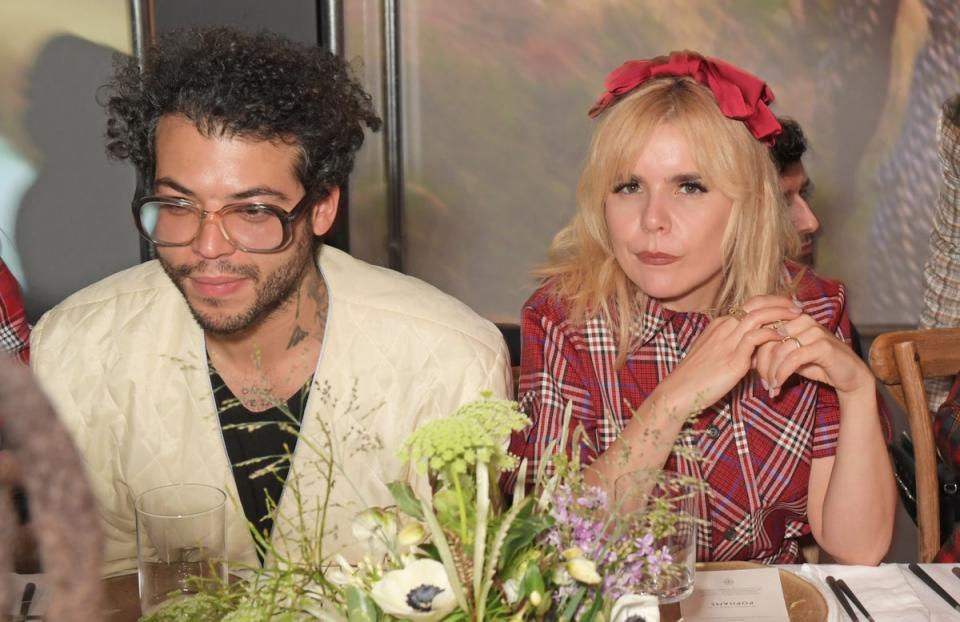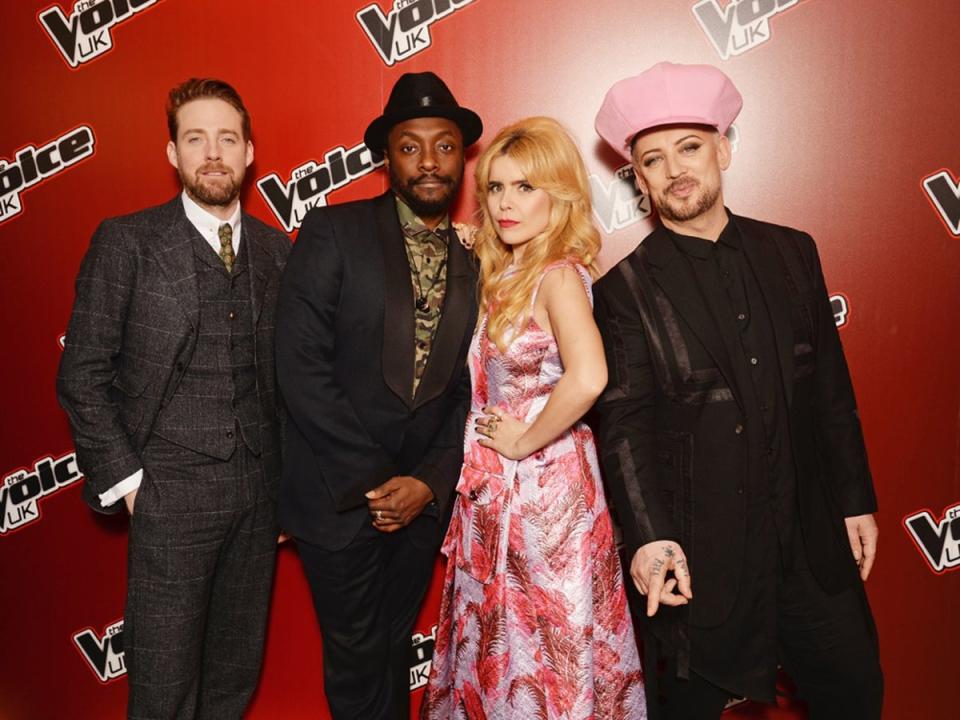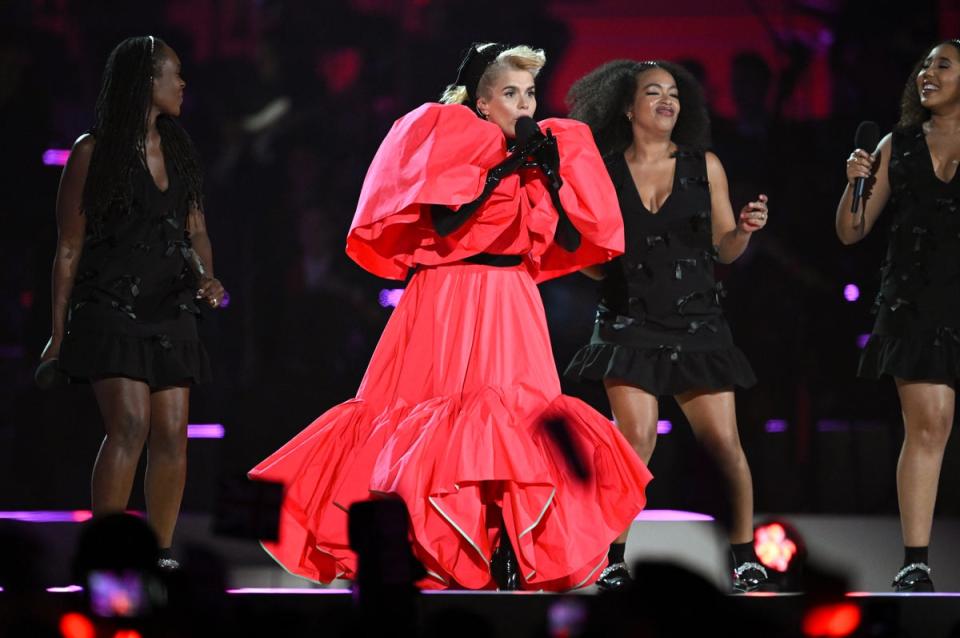Paloma Faith on her heartbreak and being a single mum: ‘Our relationship ended because we had those children – it was worth it’

On her way to meet me, Paloma Faith receives a text message from her therapist. “Are you going to be OK today?” he asks her, concerned. Faith is relaying this snippet of her morning to me at the same time as she is patting away tears in her eyes with the corner of a white napkin. The answer, then, is no, not really. “God, I’ve never cried in an interview across my whole career,” the actor and musician laughs, blinking up from beneath her signature blonde bangs. This interview is not like others, though. It’s the first she has given since she split from her partner of 10 years – the first since she became a single mum.
Single mum: it’s a label her own mother wore but one she is still getting used to using herself. “I am a woman in my forties with two children, who is not with their dad any more.” Faith, who is 42, declares this statement slowly and carefully, as if she is sounding out the words for the billionth time but still finding them strange and foreign on her tongue. “I’m very much in the thick of adjusting to that fact. It takes a long time to recover because it’s not like when you’re young, you can’t cut your ties and run.” Her usual heartbreak remedies – “hop on a plane and do something erratic” – are out the window. “I’d need to arrange babysitting,” Faith laughs. But in all seriousness, her kids are the priority. On her middle finger is a chunky gold ring made up of three letters: M-U-M. “There’s very little time left for me, really. I don’t do much. I don’t allow myself much time for enjoyment.”
It is ironic, then, that Faith is such good fun to be around. And that her new album is such good fun to listen to – in spite of its subject matter. Glorification of Sadness is a divorce album without the divorce. “People think I’m married because they cannot believe that I’d have children with someone I’m not married to!” she exclaims, a trace of Southern belle theatricality coursing through her cockney accent. Wikipedia claims she married French visual artist Leyman Lahcine in a 2017 ceremony. Ring or no ring, the breakup hit her hard. She wrote songs to capture her state of mind: weak; strong; vengeful; despairing; euphoric; and self-destructive on the dancefloor. All things she still feels today, some 18 months after the split – hence the text from her therapist this morning.
Like Adele before her, Faith is something of a patron saint when it comes to heartache. Take a gander at her back catalogue, chock-full of hits with titles like “Can’t Rely on You”, “Picking Up the Pieces”, “Loyal”, and “Only Love Can Hurt Like This”. Big emotions have served her well; she has three double platinum albums, a stint on the judging panel of the talent show The Voice, a Brit award, telly credits, and film ones, too. Chronicling the end of her relationship on Glorification of Sadness, though, was different.
Naturally, she has been thinking about what caused the split. “People always ask, what did you do? What did he do? But it was a fundamental breakdown that we were both in control of saving or letting go.” In the end, they chose to let go. Faith can trace the beginning of the end to December 2016, when she became a mother to the first of their two daughters. “You either grow together, adapting to one another like expandable foam and filling the gaps where it’s empty – or one person grows and the other stays the same,” she says. “And I think for me, becoming a mother was such a massively life-changing experience that for the first time in my life, I needed more than nothing – and the expandable foam just wasn’t there.” Later, while gushing over her daughters, she tells me, “Our relationship ended because we have those children. And I think that was worth it.” A fair trade, I suggest. “Yes, well hopefully they won’t leave me!” she laughs. “They’ll probably tell me to f*** off someday.”
There are celebrities with no filter, and then there is Faith, whose transparency has somehow endured the decade or so she has spent in an industry that fosters the opposite. Her laugh is a wonderful thing – or things, rather. There is the falsetto trill, the witchy cackle and the full-throated hoot. The latter has everyone within earshot at the members’ club where we meet craning their necks – wanting in on the joke.
Her vulnerability in person runs in contrast to the persona she has cultivated on stage. (The biggest misconception about her, she says, is that she is strong.) Any given performance, you will find Faith in full regalia – towering heels, and a flamboyant outfit, which is not always but often topped off with a fabulous headpiece – working the crowd with her wrist-curling gestures and confident east London charm.

More than once, stepping into character has given Faith refuge in hard times. “I have gone on stage while going through the most insane things that I have kept private,” she says. It’s like being unreachable on a plane. “Whatever’s going on off stage, I can’t do anything about it now because I’m providing a performance for these people.” In a similar vein, when she had a miscarriage on the set of HBO’s Pennyworth, a superhero spin-off about Batman’s butler, Faith emerged from the loo and carried on as normal. “I just told people I had a bad tummy,” she says. “What’s the difference? I tell the director; they send me home and I’m sat there bored out of my mind, thinking about it.”
The process gives her perspective, Faith says, and allows her not to be consumed by any one event. “I bet some people would call it a trauma response, like disassociating – but the good thing is it’s always there waiting for you when you want to go back and deal with it. It’s like a filing cabinet for trauma.”
Faith would disassociate as a child, too. When her parents fought, which they did a lot, she would tune out and become absorbed in a film. They got divorced when she was two and the fallout has left a mark on Faith and dictated how she wants to handle her own separation. “I think that’s why my relationship with my kids’ dad is so good,” she says. “I remember my parents just hating each other and being witness to it, having to pass messages between them. We don’t have that – and I do think my children are really happy.” Their school was surprised to even learn of the split, she says. “We’re both emotionally intelligent enough to know that it’s important. It’s hard but we have to be on good terms, for our kids.”
I knew I would never just have one child and if I wasn’t as old as I am, I would have more
There are still teething issues. Faith is navigating the new worlds of dating and co-parenting. (She hates the latter and thinks it is a buzzword bandied about but not fulfilled by “men who aren’t pulling their weight”). Romantically, she has hit pause – although not before she embarked on a few misjudged dates. You see, Faith is what you would call a serial dater – self-professed. “I go from one to the next and I continued that pattern pretty much after my relationship broke up,” she says. “I think there was a bit of panic initially, of not wanting to be lonely and so you don’t necessarily attach to a good match. You just fill a vacancy without looking at their CV.” It wasn’t long, however, until Faith realised she couldn’t do that any more, not now she has kids.
And when she is ready to date, she will be uncompromising. “In some ways, the breakup has left me broken but in other ways, I’m so whole. I am financially stable. I own my own house. I have children. If I ever meet a man, I’m not going to need anything from him other than us just enriching one another’s lives.” That procreation impulse has been satisfied, she smiles, mostly. “I knew I would never just have one child and if I wasn’t as old as I am, I would have more.” Forty-two isn’t that old. “I don’t think I can, biologically. It feels like I’m a bit past it – but if I got pregnant, I’d have it.” What about adoption? “I did look into it but it’s quite a difficult process in the UK and also there is some concern if you’re in the public eye because it’s potentially not great for the child.”

Anyway, all these questions are for the future. “I’m at a place today at this moment, sitting in this chair with you where probably for the first time in my life, I am actually OK with being alone,” she says. “And I’ve never been alone.” Tomorrow, Faith jokes, she may feel differently.
Beyond the logistical nightmare of a breakup that involves kids, Faith is in the process of redefining who she is. The centrepiece of the album is a sumptuous, vocal-backed anthem called “Say My Name”, which sees Faith asserting herself on repeat. “My relationship was part of my identity and now I’m looking in the mirror not knowing who I am any more,” she says. “My outline has gone fuzzy, and I need to remember who I am as an individual person – not just from the perspective of a breakup but also as a mother. It’s a strange thing when you become a child’s mum because your identity shifts and occasionally, you’ll get glimpses of it back, but ultimately, you’re their mother and that’s paramount.”
I have one daughter who loves painting her nails and wearing pink and fairy wings, and I’ve got one who finds that all disgusting
Her own relationship with her mother is fantastic; they’re best friends. More than once, she recites pearls of wisdom her mum has given her over the years. “We’re not anti-men, we’re just disappointed!” is one such gem. Faith attributes her tireless work ethic to her mum. “I think it’s because my mum was a single parent and I felt any failure I had as a child would be judged as a reflection of her parenting,” she says. “So when I had learning difficulties, it always felt that people were concerned about my mum’s ability to parent, and I wanted to prove them wrong.” Faith left school with all A*s and went on to earn her master’s in theatre directing from Central Saint Martins. “Years ago, my mum was like, ‘It’s enough! I’m really proud!’” She laughs, “But I think it’s just become a habit.”
Outside the home, she is nervous about how the media will handle the breakup, which she subtly hinted at in August, including putting #singlemum in the caption to one of her Instagram posts. “I was scared to do it but I also felt it was important otherwise people would speculate and think I was being awful if they saw me with someone else,” she says. “Some publications can be a bit unhelpful.” Having come up as a young woman in the Noughties, a period notoriously cruel to young women, Faith has reason to be suspicious.

Has she found the media landscape is kinder now than when she was in her twenties? “I think they’ve found ways around it but it’s still the same,” she shrugs. “It’s like [she mentions a specific publication] will put a hideous picture of you up and say, ‘Here she is, blooming and beautiful!’ but they know the picture is awful. Then they can say they didn’t do anything bad while still putting a picture of you crying with six double chins.” There’s that laugh again.
It makes sense, then, that privacy has been so important to Faith ever since she gave birth in 2016. For a while, she chose not to reveal her daughter’s gender, a decision she made to protect her privacy – not, as was reported, a big statement about raising her child gender-neutral. Cue the furore. It was always strange, Faith says now, that people were angrier about the idea of a mother raising her child gender-neutral than the idea of a mother violating her child’s privacy. “And one of my kids might still end up being trans,” she says. Faith, like her mum before her, doesn’t believe in gender-specific play. “I have one daughter who loves painting her nails and wearing pink and fairy wings, and I’ve got one who finds that all disgusting,” she smiles. “She’s kind of cynical in an old soul kind of way.”
Rishi Sunak should be ashamed of himself. I think a person who does what he did is not a leader
Faith has always brought an unapologetic authenticity to her career, in her music and beyond. Growing up in a multicultural family (her stepdad is Chinese; her dad is Spanish), differences were something “to be celebrated or curious about rather than demonised”. What others see as political statements, she says, is her merely showing a bit of empathy. “For me, it’s not about shouting about my opinion. It’s just me going, ‘What are you talking about? That’s wrong.’” Take Rishi Sunak, for example. Days earlier, at the Tory party conference, the prime minister came out with the transphobic declaration that “a man is a man, and a woman is a woman, it’s just common sense”.
“I’ve spoken about how I feel responsible in my position to set a good example, and Rishi Sunak is so irresponsible,” Faith says. “Whatever his opinions are, which I do not agree with categorically, but if he’s got those opinions, [voicing them like that] is irresponsible and inflammatory and it’s inciting violence. He should be ashamed of himself. I think a person who does what he did is not a leader.” Recently one of Faith’s stylists, a transgender woman, was late for a fitting. Everyone’s mind went to the worst-case scenario. “There was no discussion as to whether she missed the bus or slept in; we all were worried she had been attacked because that’s what we’re dealing with right now.” Hate crimes against transgender people hit a record high in England and Wales last year, with the Home Office report stating that comments by politicians and media over the last year may have led to the increase.

There is a prevailing sense that Faith was always a bit ahead of the times in this way. In 2013, it became front-page news when a fan uncovered that Faith was not 23 as she had publicly claimed but was, in fact, 27. Faith pulled the stunt because she knew how older – if you can even call 27 “older” – women were treated in the industry. Today, the same act would likely be recognised as a feminist statement; back then, she was hung out to dry as a rotten liar. “Somebody called me from my record company today actually and said, ‘Well you know everyone’s woke now,’ and I said, ‘I’ve been woke my whole life. I don’t know what you’re talking about,’” she laughs. Read past interviews with Faith and you’ll find her described as “kooky” more times than you can count. Today, it jars as an anachronistic term once used to describe women who were outspoken and funny. “It was irritating as hell, and misogynistic,” she says. “Zany” was another.
Faith feels that “we’re part of a generation of generally quite unsatisfied women”. She sees feminism as still in transition. “People are under the illusion that it’s completed but actually the burden on women is tenfold because of feminism at the moment,” she says. “You’ve got to be empowered, you’ve got to be good-looking, you’ve got to be young, you’ve got to earn your own money, you’ve got to raise your kids and go to work. Actually, we’re doing more than men and I think that’s not fair.”

As is the case with any breakup, reflecting on it comes with a danger. “Nostalgia is a killer,” she huffs. “You only remember the good and then you can’t help but think maybe I should have sat in unhappiness for longer.” Glorification of Sadness, with its encompassing and unsparing documentation of heartbreak, is a handy reminder not to be fooled – if not for Faith herself, then for others going through the same loss.
Suddenly, Faith has to run; her nanny has texted and she needs to get back to the kids, but not before she imparts a little hard-earned wisdom. “Don’t settle,” she grins at me, a sparkle glinting from inside her mouth; it’s coming from a diamante glued to her incisor. “Make sure you wait for the magic.” Just as she is leaving, Faith turns back around. “And have kids early! When you get to my age, you’re old and tired!”
‘Glorification of Sadness’ is out via RCA Records on 16 February

 Yahoo News
Yahoo News 
